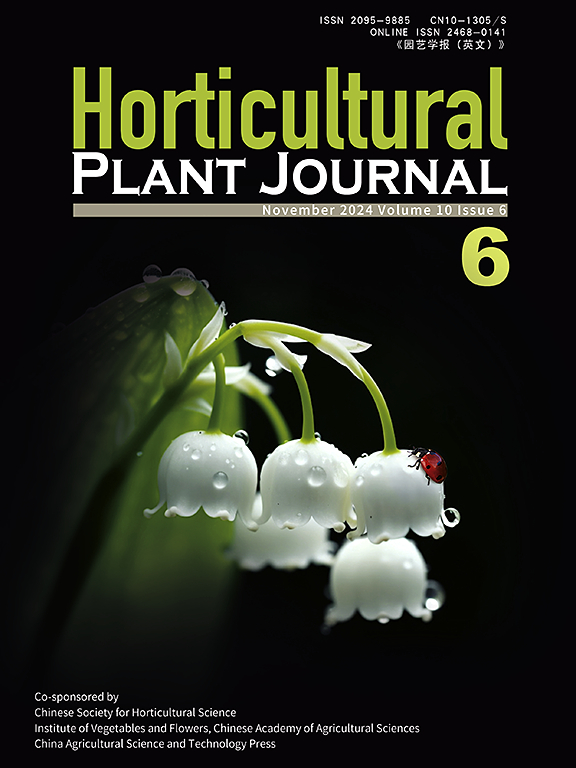独角孤内酯介导的DNA去甲基化诱导苯丙类生物合成缓解番茄盐胁迫
IF 6.2
1区 农林科学
Q1 HORTICULTURE
引用次数: 0
摘要
番茄(Solanum lycopersicum L.)是一种重要的园艺作物,但其受盐胁迫的影响严重。GR24是独脚金内酯(SLs)的合成类似物,是一种高效无害的生长调节剂。因此,进一步探索外源SLs的作用机制是提高番茄耐盐性的必要措施。本研究采用RNA-seq分析、亚硫酸盐全基因组测序和甲基化特异性PCR对外源SLs处理的番茄品种“Micro-Tom”幼苗叶片样品进行盐胁迫分析。研究表明,外源SLs可以缓解盐胁迫对叶片数、根表面积和根体积的抑制作用。与150 mmol·L−1 NaCl处理相比,150 mmol·L−1 NaCl +15 μmol·L−1 GR24处理的叶片数、根表面积和根体积分别增加了26.67%、55.76%和55.81%,表明外源sls介导的DNA去甲基化可能在四叶期番茄幼苗耐盐性中起重要作用。rna测序和全基因组甲基化分析表明,外源SLs降低DNA甲基化水平,影响盐胁迫下苯丙氨酸代谢和苯丙类生物合成。sls介导的DNA去甲基化增加了苯乙胺(PEA)、香豆素、咖啡酸和木质素的含量,但降低了l-苯丙氨酸(LPA)和肉桂酸(CA)的含量。同时,l-苯丙氨酸解氨酶(PAL)、苯丙氨酸脱羧酶(HDC)、5-O-(4-香豆醇基)-d-醌酸3′-单加氧酶(CYP98A3)和β -葡萄糖苷酶(BGLU)活性增强,并诱导了6个与苯丙氨酸代谢相关的基因(SlPAL5、SlHDC、SlBGLU41、SlCYP98A3、SlCYP73A4和Sl4CLL7)。启动子CG位点的SlCYP98A3、基因体CG位点的SlBGLU41、基因体CHG位点的SlPAL5、启动子CHG位点的SlPAL和启动子CHG位点的SlHDC的去甲基化可能导致这些基因的转录,激活其他基因的表达。这些结果表明,外源SLs可能通过调节苯丙氨酸代谢和苯丙类生物合成来提高番茄幼苗的耐盐性。研究结果为深入分析SLs在非生物胁迫下的响应机制提供了参考。本文章由计算机程序翻译,如有差异,请以英文原文为准。
Strigolactone-mediated DNA demethylation induces phenylpropanoid biosynthesis to alleviate salt stress in tomato
Tomato (Solanum lycopersicum L.) is an important horticultural crop, but it is seriously affected by salt stress. GR24, the synthetic analogue of Strigolactones (SLs) is used in the study as an efficient and harmless growth regulator. Therefore, further exploration of the mechanism of exogenous SLs is necessary to improve tomato salt tolerance. In this study, RNA-seq analysis, sulfite whole genome sequencing and methylation-specific PCR were used to conduct salt stress analysis on the leaf samples of the tomato variety "Micro-Tom" seedlings treated with exogenous SLs. Research shows that exogenous SLs alleviate the inhibition of the number of leaves, root surface area and root volume resulting from salt stress. Compared with the 150 mmol·L−1 NaCl treatment, 150 mmol·L−1 NaCl +15 μmol·L−1 GR24 treatment increases the leaf number, root surface area and root volume by 26.67 %, 55.76 % and 55.81 %, respectively, suggesting that exogenous SLs-mediated DNA demethylation may play an important role in the salt tolerance of the four-leaf stage tomato seedlings. RNA-sequencing and genome-wide methylation analysis show that exogenous SLs reduce DNA methylation levels to affect phenylalanine metabolism and phenylpropanoid biosynthesis under salt stress. SLs-mediated DNA demethylation increases phenethylamine (PEA), coumarin, caffeic acid, and lignin contents, but decreases l -Phenylalanine (LPA) and cinnamic acid (CA) contents. Meanwhile, the activities of l -phenylalanine ammonia-lyase (PAL), phenylalanine decarboxylase (HDC), 5-O-(4-coumaroyl)-d -quinate 3′-monooxygenase (CYP98A3), and beta-glucosidase (BGLU) are enhanced, and 6 genes related to phenylpropanoid metabolism (SlPAL5 , SlHDC , SlBGLU41 , SlCYP98A3 , SlCYP73A4 , and Sl4CLL7 ) in the pathway were induced. The demethylation of SlCYP98A3 at CG site in promoter, SlBGLU41 at CG site in gene body, SlPAL5 at CHG site in gene body, SlPAL at CHG site in promoter and SlHDC at CHG site in promoter may result in the transcription of the genes, activating other genes expression. These findings demonstrate that exogenous SLs may improve the salt tolerance of tomato seedlings by regulating phenylalanine metabolism and phenylpropanoid biosynthesis. The results provide a reference for in-depth analysis of the response mechanism of SLs under abiotic stress.
求助全文
通过发布文献求助,成功后即可免费获取论文全文。
去求助
来源期刊

Horticultural Plant Journal
Environmental Science-Ecology
CiteScore
9.60
自引率
14.00%
发文量
293
审稿时长
33 weeks
期刊介绍:
Horticultural Plant Journal (HPJ) is an OPEN ACCESS international journal. HPJ publishes research related to all horticultural plants, including fruits, vegetables, ornamental plants, tea plants, and medicinal plants, etc. The journal covers all aspects of horticultural crop sciences, including germplasm resources, genetics and breeding, tillage and cultivation, physiology and biochemistry, ecology, genomics, biotechnology, plant protection, postharvest processing, etc. Article types include Original research papers, Reviews, and Short communications.
 求助内容:
求助内容: 应助结果提醒方式:
应助结果提醒方式:


